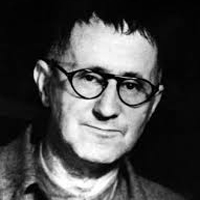Conflict between Faith and Doubt in Galileo
Brecht's Galileo dramatizes the warfare between faith and doubt (reason). It has been widely assumed that faith is the foundation of religion. Religion comes into existence only through the agency of faith. In contrast, science comes into being on the strength of doubt and reason. Disciples of science are of the view that doubt is the gateway of science, whereas faith is the matrix of religion.

Bertolt Brecht (1898-1956)
Since time immemorial people have been persuaded that faith is the only way to truth. This view has an absolute say in the community of religious people. In the community of the seventeenth century Christian thinkers in the west this view had gained an absolute hand. The 17th century Christian thinkers believed that the ultimate way to truth is faith.
In the 17th century Galileo Galilei found out a new way to truth. His new way is the way of reason, the way of doubt, and the way of creative skepticism. Galileo gave birth to a reasonable, an experimental, and an inductive method of making an inquiry. Through this method Galileo began his investigations and observations. What he found ultimately is the scientific truth. He invented telescope. This device enabled him to declare that the universe is not as perfect and spotless as Ptolemy, Aristotle and champions of the Bible had supposed. Galileo sought to give an explanation for the limitations of Ptolemaic - Aristotelian - Christian world view. Galileo pointed out certain faulty issues in the philosophy of Aristotle. He found out the four moons of Jupiter. He proved the Ptolemaic theory about the celestial motion incorrect. Most importantly, he stated that the Copernican heliocentric theory is correct at all points. In this way Galileo found out totally new truths. These new truths of Galileo were radically different from the conventional truths established by the traditional Christian astronomers. Galileo succeeded in finding out these iconoclastic truths by doubting all those erstwhile truths. Had Galileo not been reasonable enough to doubt the erstwhile truths, he might not have arrived at his new scientific conclusion. Having acquired a bunch of scientifically and experimentally proven findings, Galileo declared that reason and doubt rather than faith can lead to better destinations of mankind. This claim of Galileo happened to offend the Christian Inquisition. The Christian Inquisition felt that Galileo's claim is a painful insult to the stronghold of Christian dogma. Since a thousand years those religious fanatics had been drugged by the opium of religion, they were blinded by faith. For them faith is and ought to be sovereign in each and every moment. That is why the Inquisition became intolerant of Galileo's genuine and sense based truths. Thus, arose a controversy between science and religion, between rational doubt and religious faith. It is this controversy in which the seventeenth century, Galileo was enmeshed. Galileo had to become courageous and heroic in his single handed battle against the superstitious Inquisition, against the organized superstitions of Christianity. But Galileo did not have that much courage and dauntlessness. He was somewhat timid. Due to this timidity he began to waver in his own conviction. He was afraid of the physical punishment the Inquisition was going to level against him. That is why Galileo decided to compromise. His decision to compromise led to the recantation. The recantation of Galileo marked the humiliating defeat of doubt and the unashamed triumph of the Christian superstition. Galileo's recantation brought to an unprecedented halt the march of progress made in the territory of science. The defeat of doubt does not mean the end of the age of science. Doubt did not die, reason was not eliminated. These two elements of doubt and reason of science were temporarily defeated. But at the underlying level rational skepticism and creative doubt have been working jointly to shatter the ego of faith in the future.
In thirteen chapter, we find Galileo working on the project of his scientific investigations. At that time his eyesight was almost damaged. With his dim eyes also Galileo did not renounce his sustained interest in conducting scientific inquiry. Galileo, in the final scene of course, felt humiliated for not being heroic at the moment of defending his truth. But he was also of the conviction that science must not be associated with the name of one scientist only. Science is the grand project to which every disciple of science must make contributions. The failure of one scientist does not mean the failure of science.
Galileo Study Center
Introduction of Brecht's Galileo
Dramatic Irony in Brecht's Galileo
Significance of Telescope in Brecht's Galileo
Brecht's Dramatic Technique in Galileo
Elements of Experimental Modernism in Galileo
Marxist Standpoint of Brecht in Galileo
Spirit of Science and Galileo in Brecht's Galileo
 |
bachelorandmaster.com |